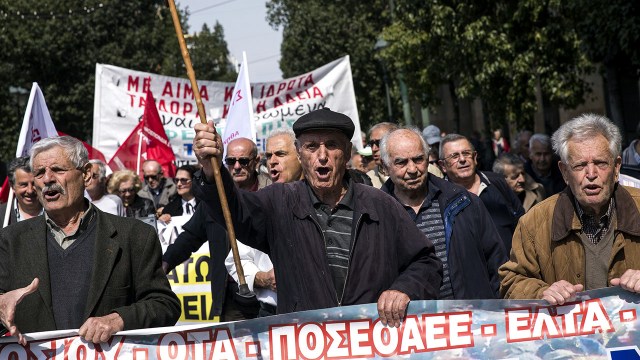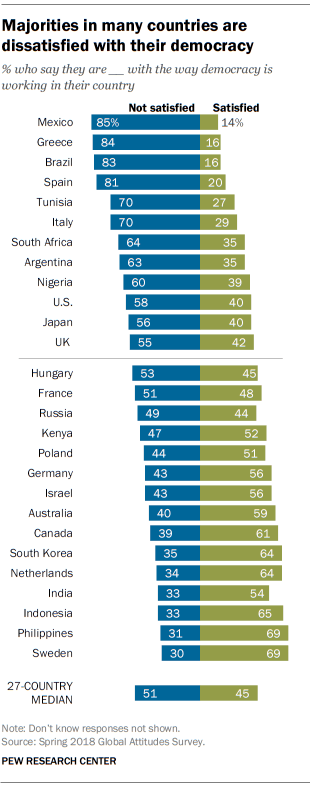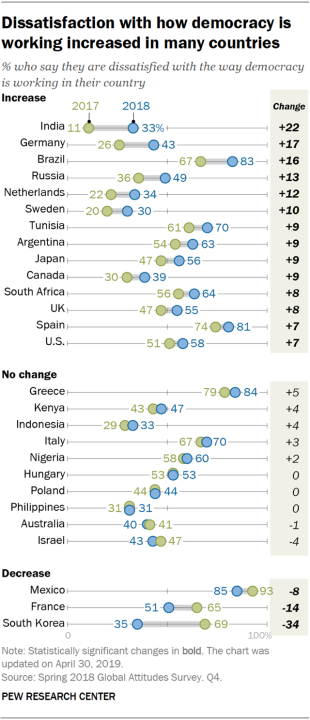
Across 27 nations surveyed by Pew Research Center in 2018, people were more dissatisfied than satisfied with the way democracy is working in their country. This held especially true in a dozen countries where negative views of democracy outpaced positive by more than 10 percentage points.

The 12 countries most dissatisfied with their democracy included four – Mexico, Greece, Brazil and Spain – where eight-in-ten or more were dissatisfied with the state of democracy, and another five where six-in-ten or more expressed dissatisfaction: Tunisia, Italy, South Africa, Argentina and Nigeria. The United States was close behind, with 58% expressing unhappiness with the way democracy is functioning.
People’s views of their country’s economy were strongly linked to their views of democracy. In nine of the 12 countries most dissatisfied with democracy, at least two-thirds of those who said their country’s current economic situation is bad also were dissatisfied with democracy. (In the remaining three – Greece, Tunisia and Brazil – so few people said the economy is good that the relationship between views of the economy and of democracy could not be analyzed. In these countries, 90% or more of the public was unhappy with the economy.)
Attitudes toward elected officials also often aligned with the degree to which people were satisfied or dissatisfied with democracy. In the 12 most dissatisfied countries, majorities said the statement “elected officials care what ordinary people think” does not describe elected officials well – a view especially common in Greece (90%), Argentina (79%), Spain (79%) and Brazil (78%). In the U.S., 58% described their country as one in which elected officials do not care about the people.
Political corruption was another common concern in the countries most dissatisfied with democracy. Substantial majorities in seven of these 12 countries said the statement “most politicians are corrupt” describes their country well – including about nine-in-ten (89%) in Greece and roughly six-in-ten or more in South Africa (72%), Nigeria (72%), Italy (70%), the U.S. (69%), Tunisia (67%) and Argentina (63%).
And majorities in seven of the 12 countries most dissatisfied with democracy said that in their country, no matter who wins an election, things do not change very much. Skepticism in elections’ ability to change things ran highest among Greeks – 82% of whom doubted their elections led to much change – and was also common in Tunisia (67%), the UK (65%), Japan (62%) and South Africa (61%).

Between 2017 and 2018, dissatisfaction with democracy grew in 14 of the 27 countries surveyed, with the largest increases in India and Germany – as well as Brazil, where two-thirds of the public already had a negative view in 2017.
But several countries showed a decrease compared with the previous year. This was most notable in South Korea, where dissatisfaction with democracy fell by 34 percentage points – the largest shift in either direction among countries surveyed. Over this period, President Park Geun-hye was removed from office on corruption charges and sentenced to 24 years in prison. And although Mexico was the most dissatisfied with democracy of countries surveyed in 2018, the share who expressed dissatisfaction declined by 8 points from a year earlier.
Opinions of the state of democracy weren’t bleak everywhere. In eight countries surveyed, four-in-ten or fewer said they were dissatisfied with democracy, with dissatisfaction lowest in Sweden (30%) and the Philippines (31%).
